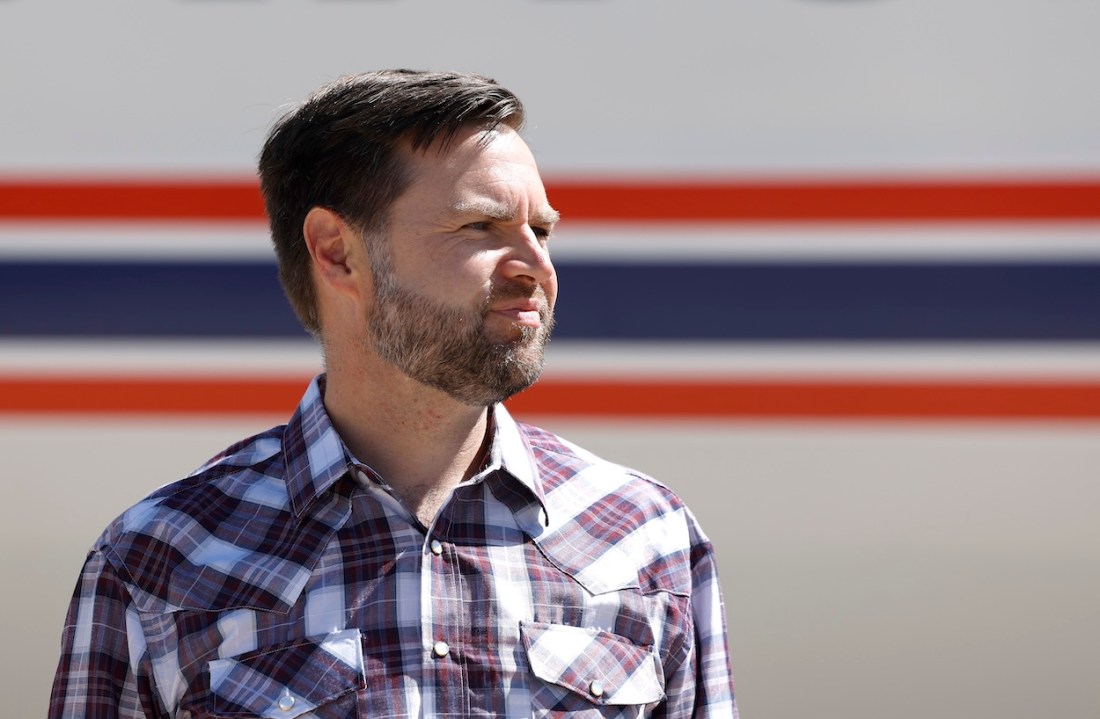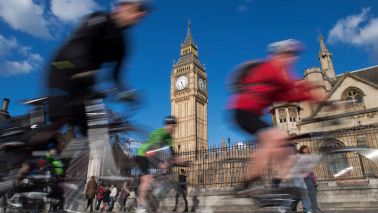Two photos from the youth of Republican vice-presidential candidate J.D. Vance have recently surfaced and are filling his opponents with glee. In one of them, he’s dressed as a woman, with shoulder-length golden hair, a look of yet-to-be-plucked wistfulness, and three days of teenage stubble. The other shows him loitering in a men’s bathroom, a faint aura of The Munsters about him, as three smiling young women (fellow members of his Ohio school’s student government) pretend to relieve themselves standing up into a row of urinals. Along with his views on abortion (at the battier end, admittedly, of the pro-life movement) and his strong take on women’s role within the family – ‘If your worldview tells you that it’s bad for women to become mothers but liberating for them to work 90 hours a week in a cubicle at the New York Times or Goldman Sachs, you’ve been had’ – they have given fuel to the Democrat idea that, like Trump, Vance is ‘weird’ and has a problem with the opposite sex.
Whether this will hit home with voters is another question. Democrats will have their work cut out for them arguing that the first photo is proof of anything unsavoury – since when did they disapprove of men in women’s clothing? Equally, how can a party associated with unisex public bathrooms cavil at the second (couldn’t Vance put the photo forward himself as evidence of early, swinging open-mindedness about gender)? There may be an oddity about both snapshots, but the fact is they’re hardly unique. For most teenage boys – those who don’t necessarily shimmy through high school years as an Alpha-hit with their female colleagues – adolescence is a profoundly unsettling time, one of sweaty awkwardness, existential doubt, and bottles of Biactol drained as quickly as a wino downs a litre of hooch. Vance’s photos do nothing but paint him as a fairly normal teenager. To see true adult weirdness, one need only watch clips of Kamala Harris’s unprompted maniacal laughter or the way running mate Tim Walz’s mouth hangs goofily open at times, like Fozzie Bear expressing wonder on the Muppet Show.
For most teenage boys – those who don’t necessarily shimmy through high school years as an Alpha-hit with their female colleagues – adolescence is a profoundly unsettling time
Besides, what if Vance was a ‘weird’ teenage boy? Most of us, men and women, still shudder with horror at our teenage selves and will sympathise. The writer Dennis Potter once said we should look back on our youth with a kind of ‘tender contempt, and we’ll probably find the second part of that emotion much easier to access. It’s not that we were wicked, more we had a tendency to be fatally unguarded, manically egocentric, and clueless about what would work for us and what wouldn’t. We trusted too much, our weaknesses were freely on display, and we’d mistaken the imminent, lasting afflictions of our lives (oh, how they fly in like planes once adolescence kicks in) for temporary conditions that could be solved by a new haircut or a change of clothes. It’s in your teenage years you fall most recklessly in love, not only with potential romantic partners but with your friends as well, sure you’ll be sitting round the same (or better) tables with these people for the rest of your life’. In such a state of naive trustfulness, Vance and those like him can surely be allowed a few klutzy indiscretions. One Nikki May, treasurer of the same student council which supplied that female trio of urinal-botherers, had this to say about the young Vance: ‘He was a great student and guy. I am very proud to say I went to high school with J.D. and very impressed of the man he has become.’
Could that be said of all of us? Like many, I look back on my own teenage years and can only sympathise with Vance. There is a photo of me aged about 15, fresh-faced and perky looking, the wall of my room at school covered with pictures of the Kray Twins (don’t ask me why this gruesome pair appealed to me – I supposed it was to do with masculinity, danger, and good tailoring). I even wrote a play about them, performed as part of a school drama festival, with squeaky-voiced public schoolboys snarling at each other in cockney-rhyming slang or lines I’d lifted verbatim from the Long Good Friday (you have actually to hear the line ‘I’ll have his carcass dripping blood by midnight’ delivered in a Rees-Mogg accent to realise these things don’t always translate). But then, Ronnie and Reggie were only part of the weirdness. There were the series of true crime books about people like Dennis Nilssen or Myra Hindley. Or the lip gloss and eyeliner I wore, David Sylvian style, in the early 1980s, or the antique cigarette holder I (tragically) waved about for a season, or the way I’d dab on fake stubble with my sister’s mascara to try to gain underage entry to Chelsea nightclubs. Would any of this help a political career?
Well, perhaps it might. Weirdness has quite a good track record when it comes to success. Morrissey hung out in graveyards. The young Margot Robbie had clear-lensed spectacles made up, just so she could look like Harry Potter. Steve Jobs never washed and had heinous BO. And though none of them were in politics, you could argue that those who have known true weirdness in their youths, blundering through the awful phantasmagoria of adolescence, learn at an early age about real injustice: that teenage charisma is bestowed by the gods far more randomly than wealth.
Besides, who’ll disagree completely with Vance’s 2021 statement that the US (and by extension, Great Britain) is ‘effectively run by a bunch of childless cat ladies’ who are ‘miserable at their own lives and the choices they’ve made, and so they want to make the rest of the country miserable too’?
Cats aside (I have two myself), it would take a somnambulist or a Starmer supporter not to notice that in the last woeful decade, western culture seems to have been taken over wholesale by the most unpopular kid in the class: the one who mistrusted fun because they never had any, was out to sabotage everyone’s love life as they didn’t have one of their own, and was the mortal enemy of laughter, having provoked it themselves only unintentionally. The kid who invariably sneaked gleefully on their classmates and got a pat on the head from teacher for so doing. For over a decade or so we’ve exalted these people, told ourselves they’re on the side of the angels, thanked them as they squatted over us and – in boardrooms, editorials, on quangos and, recently, in landslide governments – handed them power. J.D. Vance can sleep easy, I’d guess, because what could be weirder than that?
This article is free to read
To unlock more articles, subscribe to get 3 months of unlimited access for just $5








Comments
Join the debate for just £1 a month
Be part of the conversation with other Spectator readers by getting your first three months for £3.
UNLOCK ACCESS Just £1 a monthAlready a subscriber? Log in